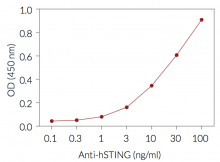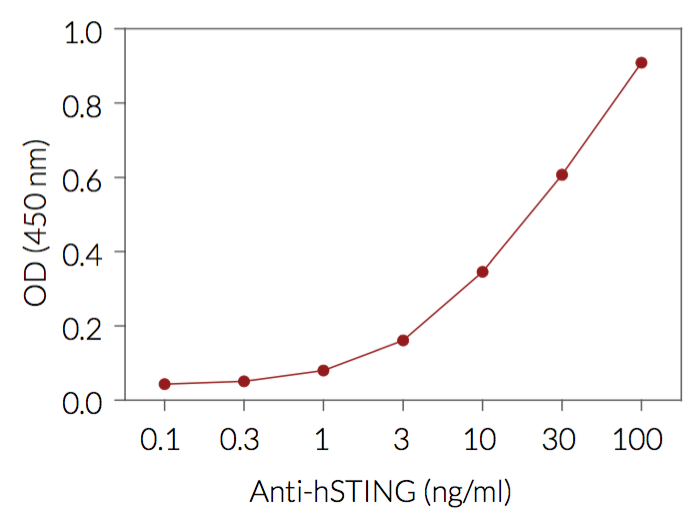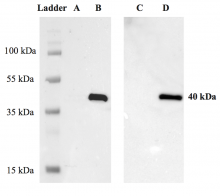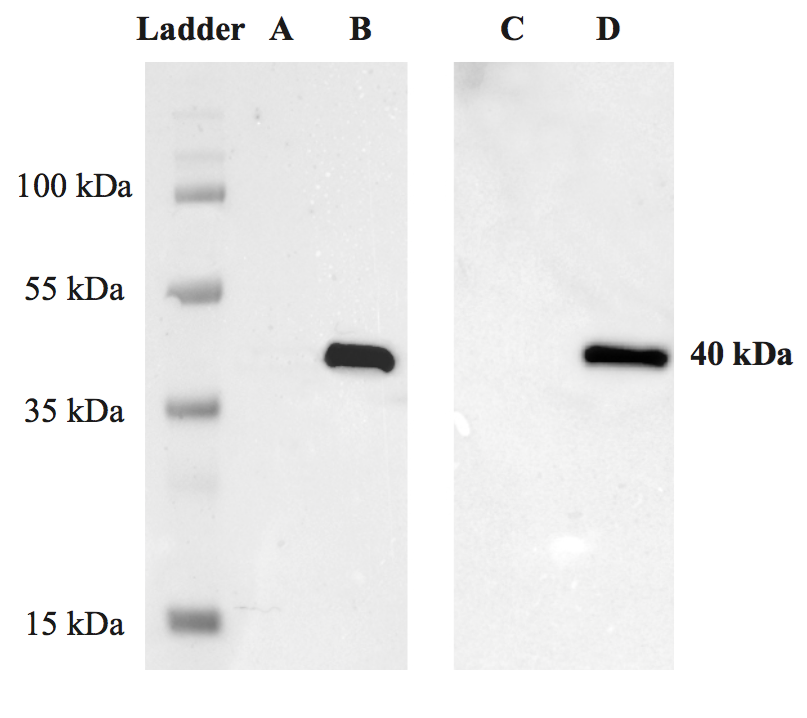Anti-human STING antibody
| Product | Unit size | Cat. code | Docs. | Qty. | Price | |
|---|---|---|---|---|---|---|
|
Anti-hSTING-IgG Monoclonal antibody against human STING (clone 3B5) |
Show product |
2 x 100 µg |
mabg-hstg-2
|
|
Monoclonal antibody against human STING for detection

Human STING detection with Anti-hSTING-IgG
Anti-hSTING-IgG (clone 3B5) is a monoclonal mouse IgG1 antibody against human STING (hSTING). This antibody was generated by InvivoGen using DNA immunization. It has been produced in hybridomas and purified by affinity chromatography.
Anti-hSTING-IgG has been selected for its ability to bind hSTING. It recognizes the most prevalent isoform “wild‑type” R232 and HAQ hSTING variants. This antibody can be used to detect hSTING using ELISA and Western blot.
STING (stimulator of interferon genes) is essential for the interferon response to cytoplasmic foreign or self-DNA. It directly senses cyclic dinucleotides (CDNs), which are important messengers in bacteria and innate immune agonists in mammals [1]. Several STING variants, that differ in their responses to CDNs, have been described in the human population [2].
Key features:
- Reacts with the “wild‑type” R232 (R71‑G230-R232-R293) hSTING variant
- Reacts with the HAQ (H71‑A230-R232-Q293) hSTING variant
- Provided azide-free
- Each lot is functionally tested
Applications:
- Western blot
- ELISA
References:
1. Sun L. et al., 2013. Cyclic GMP-AMP synthase is a cytosolic DNA sensor that activates the type I interferon pathway. Science. 339:786-91.
2. Yi G. et al., 2013. Single nucleotide polymorphisms of human STING can affect innate immune response to cyclic dinucleotides. PLOS One. 8:e77846.
Back to the top
Specifications
Target: Human STING (hSTING) R232 variant (soluble CDN-binding domain)
Specificity: Reacts with the “wild‑type” R232 (R71‑G230-R232-R293) and HAQ (H71‑A230-R232-Q293) hSTING variants. This antibody reacts very poorly with murine STING. No reactivity was observed with the STING‑knockout cells.
Clonality: Monoclonal antibody
Clone: 3B5
Isotype: Mouse IgG1, kappa
Control: Mouse Control IgG1
Source: Hybridoma cells
Purity: Purified by affinity chromatography with protein G
Formulation: 0.2 µm filtered solution in a sodium phosphate buffer with glycine, saccharose, and stabilizing agents
Tested applications: Detection antibody for Western blot and ELISA.
Quality control:
- The antibody has been validated by Western blot.
- The absence of bacterial contamination (e.g. lipoproteins and endotoxins) has been confirmed using HEK-Blue™ TLR2 and HEK-Blue™ TLR4 cells.
Contents
- 2 x 100 µg of purified Anti-hSTING-IgG provided azide-free and lyophilized.
![]() Product is shipped at room temperature.
Product is shipped at room temperature.
![]() Upon receipt, store lyophilized antibody at -20°C.
Upon receipt, store lyophilized antibody at -20°C.
Details
STING (stimulator of interferon genes) has become a focal point in immunology research and drug discovery [1, 2]. In a healthy individual, STING functions as a signaling hub, orchestrating immune responses to pathogenic, tumoral, or self-DNA detected in the cytoplasm [2]. Upon activation, STING induces type I interferon (IFN) production through TANK-binding-kinase-I (TBK1)-mediated IFN regulatory factor (IRF3) signaling [2]. STING activation also leads to NF‑κB-dependent inflammatory cytokine production [2]. In some autoimmune diseases such as STING-associated vasculopathy with onset in infancy (SAVI), STING is constitutively activated resulting in high IFN production [3, 4]. The discovery of a mechanism to pharmacologically inhibit STING should lead to new treatments for such diseases.
Reference:
1. Haag S.M. et al., 2018. Targeting STING with covalent small-molecule inhibitors. Nature 559:269-73.
2. Ishikawa H. & Barber G.N. 2008. STING is an endoplasmic reticulum adaptor that facilitates innate immune signalling. Nature 455:674-8.
3. Liu Y. et al., 2014. Activated STING in a vascular and pulmonary syndrome. N Engl J Med. 371:507-18.
4. Jeremiah N. et al., 2013. Inherited STING-activating mutation underlies a familial inflammatory syndrome with lupus-like manifestations. J Clin Invest. 124:5516-20.








